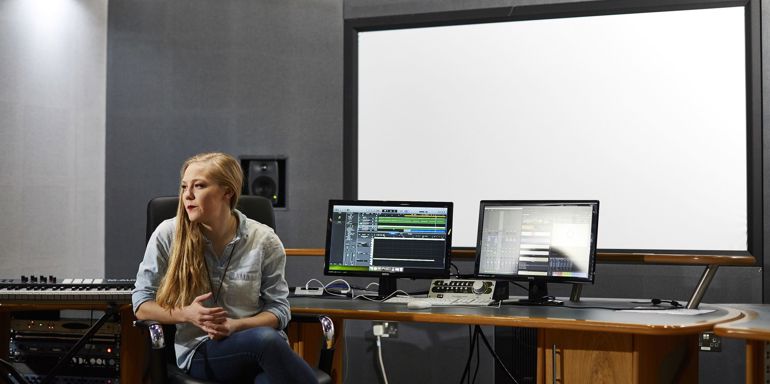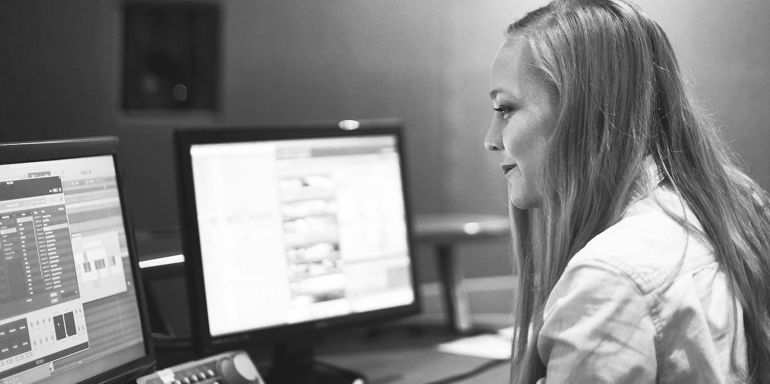
Course Studied: BA (Hons) Music (Film Music)
Year of Graduation: 2019
Top Career Highlights:
- Scored first feature film, 'Creatures' and attended the film premiere (albeit virtually!)
- Set to receive mentorship with Casino Royale's Nicholas Dodd for graduating top of class
- Set to score impactful short film starring '2001: A Space Odyssey' lead Keir Dullea
Hailing from the US, Olivia Crawford combines a busy schedule as a frontline medical worker by day, and a film and video game composer by night.
Her latest work includes the score for the film Creatures (Vol. 1).
We were fortunate enough to catch up with Olivia to find out more about her decision to study in the UK and experiences of our Film Music degree programme. She also provides some advice for recent graduates on how to develop your career, beyond formal study.
What prompted you to move from the US to Leeds?
Out of New York, California and Leeds, I was drawn to Leeds Conservatoire's Film Music degree, because it stood out as a program that was devoted to each and every student's career. Both the 1-on-1 training and Film Nights greatly appealed to me, and both have later proved to be incredibly beneficial to improving the professionalism of my work.
The Film Night experience really drove us as students to compose our best work for the visiting industry guests. They provided really insightful and detailed feedback for improving composing and mixing techniques, which has proved incredibly helpful. I'm obsessed with orchestration, so having multiple opportunities to gain personalized orchestration tips from Nicholas Dodd was beyond a dream come true! I know those benefits of the program really benefited my career, and I'm very glad I chose to attend Leeds Conservatoire!
How do your experiences of living in the US and the UK help with your understanding of the music for moving image industry?
Living in both the US and the UK has helped highlight one of the biggest benefits of this field, and that is the ability to work remotely (which proved very useful in 2020!). Thankfully the lessons I learned from Stefan regarding the director-composer relationship, along with in-depth understanding of analyzing film has greatly helped my ability to maintain strong working relationships with directors in the UK. I know that was sort of wordy, but to sum it up, his lessons helped me discuss the film-making and story-telling process in incredible detail with directors; a crucial skill that directors have really appreciated! In fact, it's a trait that directors have openly addressed as a factor in why they choose to work with me consecutively, and establishing that bond with a director can be vital to developing a successful film career! For example: Williams and Spielberg, Zimmer and Nolan, Herrmann and Hitchcock, to name a few.
What ignited your passion for composing music for moving image?
I started using the piano in our living room as a journal of sorts, and was quickly attracted to the emotive impact and imaginative story-telling properties that instrumental music has. As a kid, I was drawn to the music in "Mighty Joe Young" that made me cry for a fictional gorilla, or the power of Fernando Velasquez's score to "The Impossible" that makes me cry every time I watch it, without fail (and I wish I was kidding!). My passion for film and film music has deep roots in the power of story-telling; where I can be a part of a project that helps people have an emotional experience; one that develops a greater sense of empathy and understanding for a world or experience that's not their own. Film can be really life-changing that way, and along the same lines of my work in the medical field, it's nice to be a part of something that hopefully makes the world a better place, even if that's concerningly cheesy!
How did studying Film Music prepare you for a career as a composer?
I actually struggled with the decision to go forward with a University degree or simply train myself via YouTube. Since graduating, I've come to realize just how imperative the program was to my career development; how much I've achieved because of it. The frequent 1-on-1 interaction alone can be identified as a reason for my achievements thus far. Being able to have extensive in-person help with production and mixing helped the quality of my music improve a lot, and consistent discussion regarding director-composer collaboration really helped like I mentioned earlier. In-depth music theory conversations also brought my music to a whole new level of complexity and professionalism. The music I was composing before starting the program may have shown potential, but it was not going to meet the intense industry demand that my music can meet now, and the education was incredibly worth it.

What is the most important thing you learnt during your time at Leeds Conservatoire that has helped you progress in your career?
It's definitely hard to boil it down to one thing, that's a tough one! Based on my strengths and weaknesses going into the degree, I'd say production and mixing lessons were most important. Having a history of violin performance and music theory training, the orchestration side came pretty natural to me, but utilizing sample libraries to produce professional and realistic sounding compositions is a really complex art. It requires really hands-on, 1-to-1 training to properly understand the technology. Though many other things I've mentioned earlier like orchestration and film analysis is also very important, a music career can't properly advance until your work meets the industry standard, and the production/mixing training really helps me achieve that.
What advice would you give to someone considering studying Film Music at Leeds Conservatoire?
To anyone considering studying Film Music at Leeds Conservatoire, my biggest advice would be to look at your current film music and film scoring experience. Whether your music sounds fake, you're not establishing relationships with directors or you can't expand your compositions from the same instruments/chords, there's likely something holding you back from feeling ready to work in the industry; it may be keeping you from getting work in the industry at all.
Whatever your composition/career weaknesses are, look into the courses that are offered in the degree and evaluate which ones help tackle your current weaknesses. If you don't currently play piano, try to learn the basics since composers that play piano generally input MIDI much faster than those who don't. Additionally, there's such a huge change and growth in the professionalism of my music from before and after my studies, and I'm sure when you really put forth the effort in each and every class, those weaknesses disappear, your music vastly improves and you'll graduate with the skills and confidence you need to take on the film industry.
If you could recommend one thing for a recent graduate to invest in to help further their career, what would it be?
I'd start with something that's not so much a financial investment as it is a sacrifice. Invest and sacrifice your time in continually developing your skills and career. Music Theory, Film Theory and the technological skills you gained from your degree can fade away the more you abandon your piano/keyboard to go on your phone. Being up to date on both young and old films helps create positive discussions with directors that leave them feeling confident in you and your work, and staying up to date on music theory and orchestration/spotting lessons helps confirm their confidence is well-placed as you continue to produce better and better music. Investing time to study and improve is really my biggest recommendation. As additional funds are available, investing in connections (business cards, websites and festival tickets) and as-needed sample libraries will also prove beneficial.







